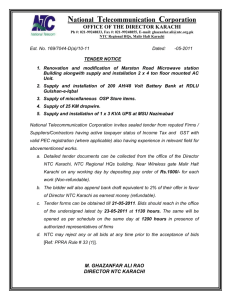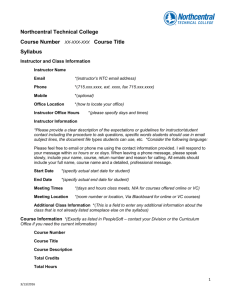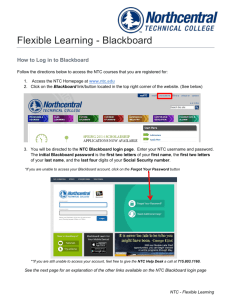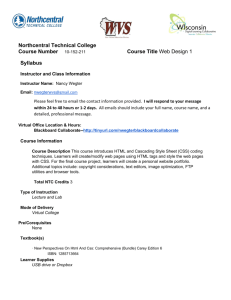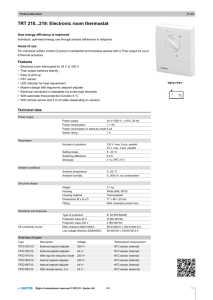NTC Syllabus - Rosholt School District
advertisement
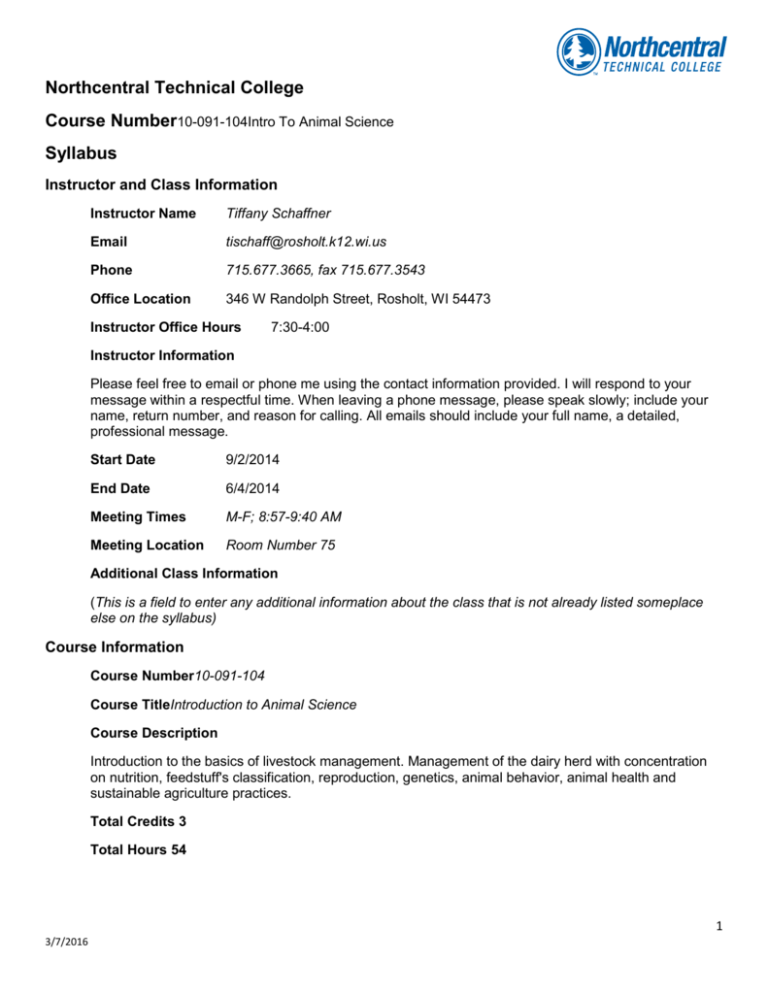
Northcentral Technical College Course Number10-091-104Intro To Animal Science Syllabus Instructor and Class Information Instructor Name Tiffany Schaffner Email tischaff@rosholt.k12.wi.us Phone 715.677.3665, fax 715.677.3543 Office Location 346 W Randolph Street, Rosholt, WI 54473 Instructor Office Hours 7:30-4:00 Instructor Information Please feel free to email or phone me using the contact information provided. I will respond to your message within a respectful time. When leaving a phone message, please speak slowly; include your name, return number, and reason for calling. All emails should include your full name, a detailed, professional message. Start Date 9/2/2014 End Date 6/4/2014 Meeting Times M-F; 8:57-9:40 AM Meeting Location Room Number 75 Additional Class Information (This is a field to enter any additional information about the class that is not already listed someplace else on the syllabus) Course Information Course Number10-091-104 Course TitleIntroduction to Animal Science Course Description Introduction to the basics of livestock management. Management of the dairy herd with concentration on nutrition, feedstuff's classification, reproduction, genetics, animal behavior, animal health and sustainable agriculture practices. Total Credits 3 Total Hours 54 1 3/7/2016 Type of Instruction Lecture, Lab, Clinical or Independent Study, Occupational, On the Job Mode of Delivery Accelerated, Campus Computer Conference, Computer Based Training, Computer Conference Online, Hybrid, In Person, Interactive Video Conferencing, Learning Your Way In-Person/Online, Online/Internet, Print Based Correspondence, Self-Paced Learning, Telecourse Correspondence, Virtual College Pre/Corequisites Pre/Corequisite: 10-091-101 ORIENTATION TO DAIRY SCIENCE. Condition: Accepted into the Dairy Science, Agri-Business or Veterinary Science Associate Degree program, or with Dean approval. Must enroll in ALL first semester courses. Textbook(s) W. Stephen Damron. Introduction to Animal Science: Global, Biological, Social and Industry Perspectives, Prentice Hall. 2009. Edition: 5th. Pages: 864. ISBN: 0135134862 Learner Supplies USB for data storage if needed. Soft Skills Soft Skills are broad outcomes or skills that every graduate of an NTC program is expected to achieve. These skills go beyond the context of a specific course or program and are the skills employers tell us they expect employees to have. For you to meet these demands, NTC has identified seven Soft Skills that are important to every area of learning. These Soft Skills are: Communicate Effectively, Act Responsibly, Work Productively, Work Cooperatively, Demonstrate Integrity, Think Critically and Creatively and Develop Global Awareness. The Soft Skills that will be a focus in this course are: Communicate Effectively Work Cooperatively Develop Global Awareness Act Responsibly Demonstrate Integrity Work Productively Think Critically and Creatively General Education Outcomes The General Education Outcomes from the General Education Assessment Committee are embedded in all of our General Education courses. Use the following list to identify the General Education Outcomes for this course. G. E. O. (1) Demonstrate comprehension of basic research methods including research design, data collection, and/or interpretation. G. E. O. (2) Recognize and respect diversity. G. E. O. (3) Evaluate the credibility of source information and accurately cite resources. G. E. O. (4) Demonstrate comprehension of relevant terminology and/or principles through effective audiencefocused communication. G. E. O. (5) Demonstrate effective use of technology in an academic context. G. E. O. (6) Apply appropriate skills and concepts to solve real world problems. 2 3/7/2016 Program Outcomes In this course you will develop knowledge and skills in support of the following Program Outcomes: Agri-Business: demonstrate good working skills, apply skills and training in the areas of marketing, dairy management, and sales, grasp the core concepts of agriculture and business management, demonstrate understanding of the major functional areas of agri-business, incorporate information from written documents, legal documents, professional literature and reports. For Dairy Science: demonstrate good working skills, develop the entrepreneurial skills to begin their own dairy production business, assist with planning and facilitating activities that support agriculture, summarize the stages of agriculture timelines and planning development, demonstrate increased awareness of sound environmental practices. For Veterinary Science: demonstrate good working skills, examine, monitor and care for dairy cattle, apply skills and training in the areas of clinic and office procedures, apply skills in animal bio-safety, demonstrate increased awareness of sound environmental practices, incorporate information from written documents, legal documents, professional literature and reports. Course Competencies Competencies are what learners will be able to do as a result of the learning experience. In this course the competencies that you must demonstrate are: 1. 2. 3. 4. 5. 6. 7. 8. Analyze the place of animals and animal science in the lives of humans Analyze nutrition, digestion, and nutrient value in feeds Examine the concept of animal health Analyze basic animal genetics Perform breed identification and dairy cattle selection skills Explain male and female reproductive anatomy and basic bovine reproduction Explore basic husbandry and care procedures for dairy animals Convey the importance of sustainable agriculture in dairy farming Course Grading Information Letter grade % or Points needed to achieve grade *All competencies must be met to earn a C or above A B+ B BC+ C D F (90%-100+%) and has met all course competencies (87%-89%) and has met all course competencies (84%-86%) and has met all course competencies (80%-83) and has met all course competencies (77%-79%) and has met all course competencies (70%-76%) and has met all course competencies (60%-69%) and/or has not met all course competencies (59% and below) and has not met all course competencies Letter grades on chart represent NTC's grading scale. *Please note there are no C-, D+ or D- grades. 3 3/7/2016 Assessment Information Final course grades can be viewed by going to www.ntc.edu, clicking on "myNTC" and following the instructions listed. For more information on grading and academic procedures please review the NTC Policies and Guidelines on this syllabus. This course is a performance-based course, designed for your success. Learning plans will be studied over the course of the semester. Each learning plan will have assessment activities or Performance Assessment Tasks (PATs) which will evaluate your performance of the course competencies. Your grade will be based on you being able to demonstrate all course competencies. In this course your performance will be assessed in the following methods: Include a list and description of items or categories which contribute to the student's overall grade. (for example: participation, PATs, tests/quizzes or daily assignments) Include % values for weighted grades or point value ranges per category for the total points method. Include information about PATs for the course. Include a statement regarding what happens if the student doesn't meet the PAT/assessment expectations. Include a statement indicating what students can expect from YOU regarding turn-around time for grading assignments/tests. Include your expectations of them about when assignments are due (especially online). Technical Skills Attainment(if applicable) In addition to assessing each course competency, your instructors will assess your ability to demonstrate each program outcome. This assessment, called Technical Skill Attainment (TSA), is important because it objectively measures your ability to meet industry-recognized skills. When you complete the TSA for your program, you will demonstrate what you know and can do. You can then share this information with prospective employers. Your instructors will tell you how and when your program TSA will be done. Attendance and Participation Consistent attendance and participation in this course is essential for your success. Demonstrating these behaviors will help you meet NTC's Soft Skills and will help prepare you for future employment. As your instructor, I will make reasonable allowances for personal illness, legitimate absences which accommodate the Americans with Disabilities Act (ADA) and absences for sincerely held religious beliefs. Whenever possible, please contact me prior to an absence to make arrangements for missed course work. Unexcused or excessive absences, however, will have a negative impact on your success in this course. Include a statement that addresses how you will handle the No Show/Drop policy. (example: No Show/Drop/Cease to Attend: Students who do not attend the first session of class or who do not complete the first assignment in Blackboard by the deadline will be considered a "No Show" and will be removed from the course. If you wish to drop this course once it is underway, you may withdraw within the first 80% of the course. Please follow the information under the NTC Student Guidelines and Procedures (website is listed below) to officially withdraw from the course. If you cease to attend and do not “officially” withdraw from this course before it is 80% complete you may receive an “F” for this course.) Online Attendance: To demonstrate consistent online attendance and participation, you should plan to log on and actively participate in the course at least 3-5 times each week. Examples of appropriate responses would be an entry into the threaded discussion, submission of an assignment, or participation in group work. (Though you are welcome to participate in the CyberCafe as frequently as you would like, this does not qualify as "attending and participating" in the course.) Online - Learner Role and Responsibilities You are an adult learner and as such you are responsible for you own learning. No one else can be a "stand 4 3/7/2016 in" for you in the learning process. You will be held accountable for all assigned activities. You matter and what you do does make a difference. You will have an opportunity to share your unique ideas and experiences with your student peers and myself. The form and content of your participation will determine the level of achievement, satisfaction, and enjoyment that you experience. Because others are depending on you to keep the course moving, you have an obligation to meet deadlines for completing assignments and postings. Virtual College - In order to succeed in a Virtual College course, you need to have the required level of computer skills, motivation and a commitment to learn and work on your own. This means that it is very important that you are independently organized, responsible, have the ability to troubleshoot and understand how to ask for help when needed. While this course has flexible assignment deadlines, you must begin your course and complete one academic assignment within the first week of your designated start date (e.g. an assignment is an academic discussion post, quiz, exam or submitted assignment). Financial aid will not be disbursed until you complete at least one assignment. To complete this course by the end of the semester, you are strongly encouraged to complete assignments each week. This will help you stay on track and be successful. If you run into issues during the semester, please contact me or Brandy Breuckman, your advisor, as soon as possible to help you work out a plan to ensure course completion. NTC Student Guidelines and Procedures Please review all of the NTC student guidelines and procedures found at this website: http://www.ntc.edu/current-students/guidelines-procedures Student Behavior Guidelines: Academic Honesty Children on Campus Computer Use Policy Discrimination and Harassment Drugs and Alcohol Student Academic Procedures: Academic Achievement Academic Appeal Academic Probation Academic Retake Add/Drop a Class Apply for Graduation Auditing a Course Challenge Test General Information: Academic Calendar College Accreditation Emergency School Closing Equal Opportunity Parking Privacy & Access to Student Records (FERPA) Privacy: Release of Student Information to Other Colleges Public Assembly Safety and Security Student Code of Conduct Student Due Process Tobacco-Free Campus Drugs and Alcohol Changing Career Programs Exceptions/Overrides Grades Grading System Graduation Requirements Refunds Transcripts Work/Life Experience Credits Refunds Religious Accommodations for Students Student Accident Insurance Student Bill of Rights Student Catalog Student Handbook Student Printing Procedure Veteran Benefits Academic Support Please visit the following sites to learn more about these services. Tutoring:http://www.ntc.edu/current-students/tutoring 5 3/7/2016 Learning Center:http://www.ntc.edu/current-students/learning-center.html Academic Accommodations NTC is committed to providing reasonable accommodations that allow students with disabilities to fully participate in the technical college environment. If you are a student with a documented disability and believe you could benefit from academic accommodations, please contact Disability Services at 715.803.1469 or visit our website http://www.ntc.edu/disability-services. NTC Student E-Mail Email is NTC’s official communication tool with students. Please check your NTC email often. All college and course communication will be through NTC student email and Blackboard. Please use professional communication at all times. Help Desk Information NTC has a Help Desk to provide technical support. Requests for help may include login and password problems, course software use, software technical problems, and browser questions. If you have questions or need assistance when you are working on your course, you can contact the NTC Student Help Desk by calling 715-803-1160, press option #2, or 1-888-682-7144, Ext. 1160, press option #2. You can also submit a help ticket online at http://www.ntc.edu/helpdesk. Please provide the following information: name of course, your student ID number, what you were trying to do, any error messages you may have received, and how to contact you. Course Revisions In this syllabus, I have provided course information and a tentative schedule to guide your learning. I do, however, reserve the right to revise this information so that I may offer you the most current content and effective educational experiences. I will communicate any syllabus or schedule changes to you in a timely manner to support your success in this course. Safety Guidelines/Regulations: 1. Respect everyone and everything. 2. Follow all of the School Policies. 3. Follow all laboratory guidelines. Class Schedule Units Place of Animals in the Lives of Humans Digestion Nutrition Nutrient Value in Feeds Animal Health Genetics Breed Identification & Selection Reproduction Husbandry Sustainability 6 3/7/2016 7 3/7/2016
